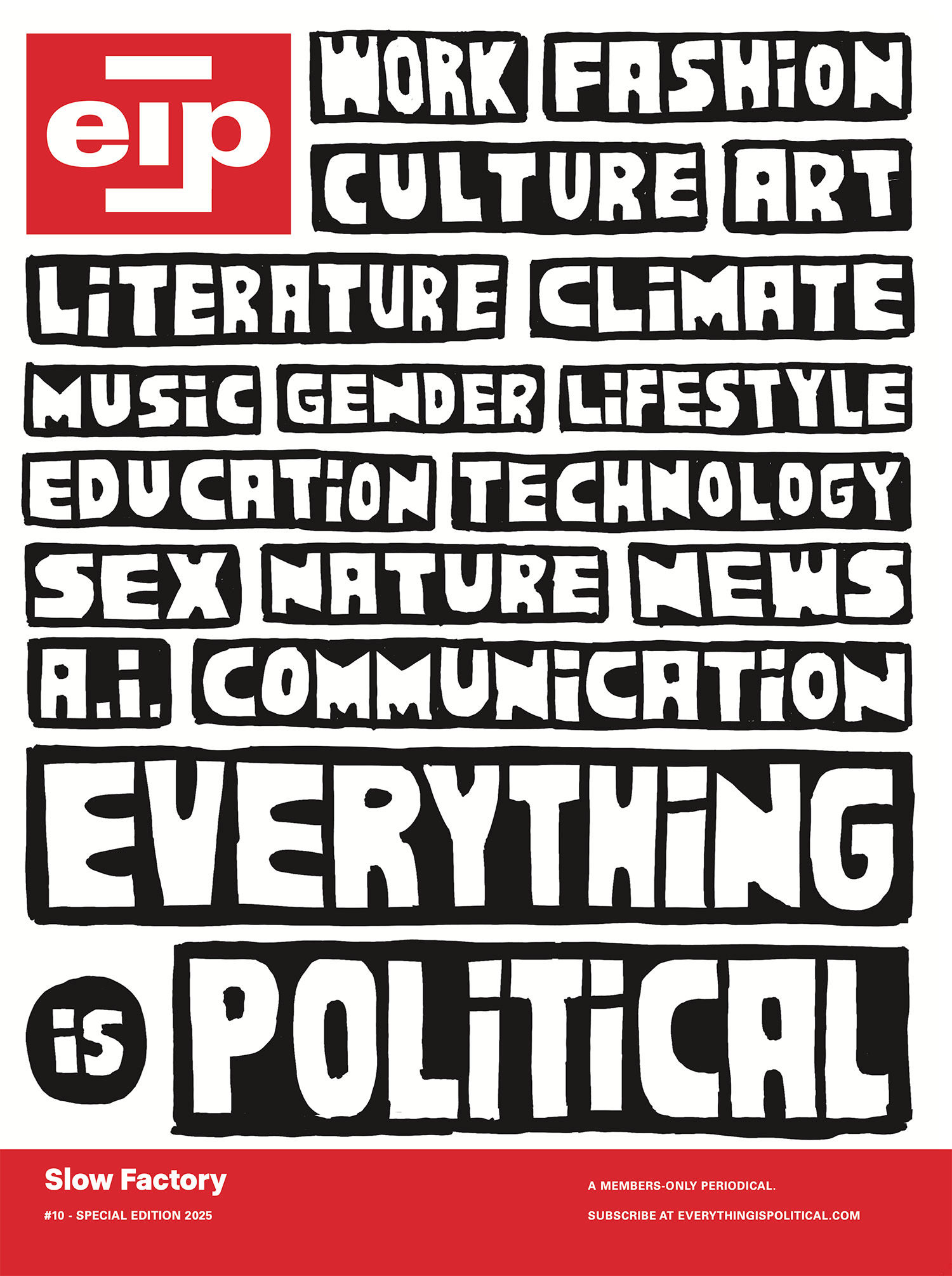Digital & Print Membership
Yearly + Receive 8 free printed back issues
$420 Annually
Monthly + Receive 3 free printed back issues
$40 Monthly
There is no future here, and yet I stay
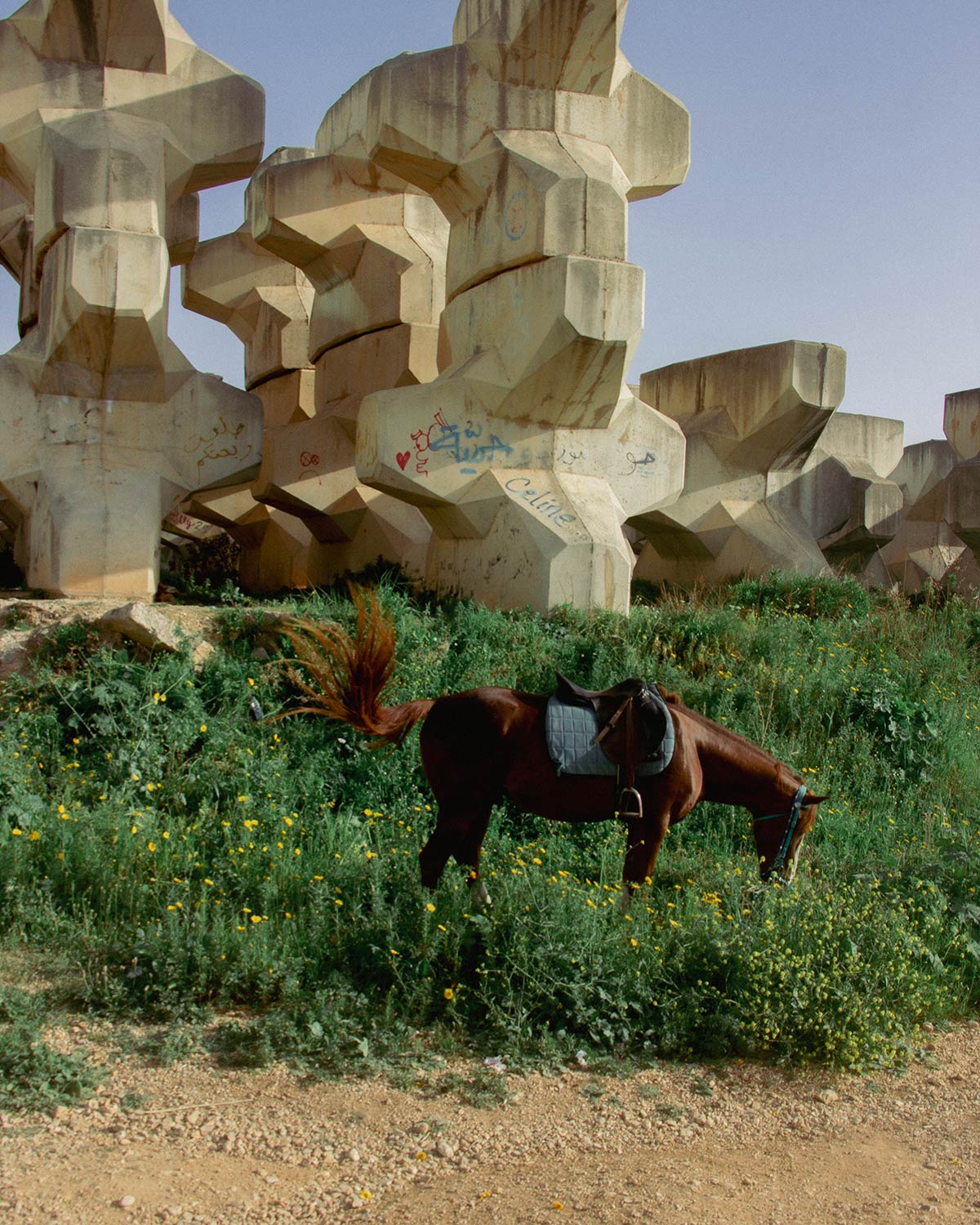
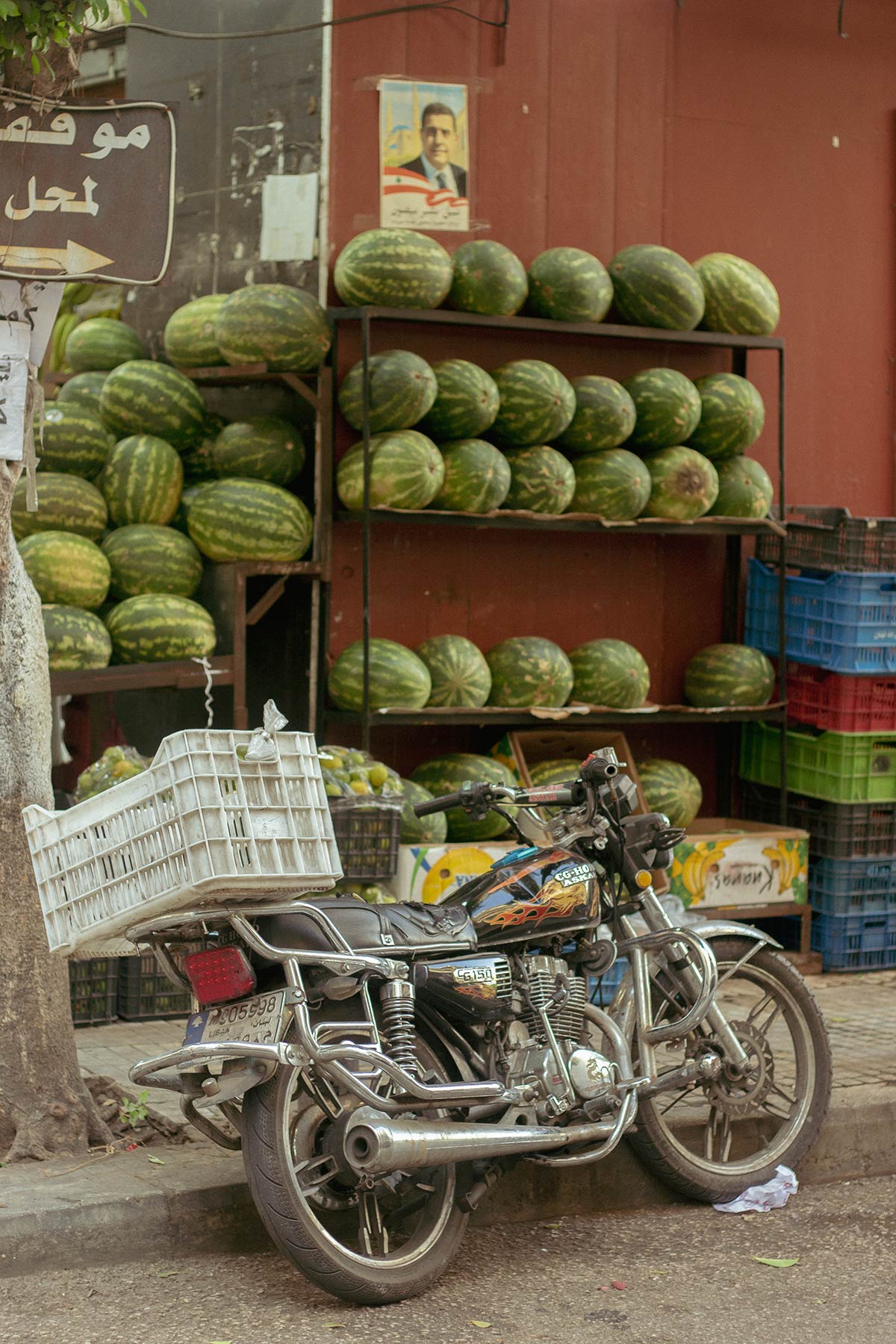
Why do we stay here? Why do we come back?
Lebanon is a difficult country to live in. It hardly provides potable water and a regular electricity supply to its residents. Most people cannot access their hard-earned savings because of the banks’ many years of mismanagement, corruption and risky lending to the government. It’s hard to come by reliable public transportation or Internet connection. Every day, there is a plethora of small frustrations: swarms of motorcycles driving in the wrong direction, going “3aks el seir,” the booming sound of privatized water trucks, garbage bins overflowing with garbage, and rats and cats fighting each other for a scrap of discarded food. When you look at Beirut from a distance, the city is covered in a persistent smog, air pollution that is blanketing the city in an ominous cloud.


Beirut, my city, is made of endless contradictions. You can have an unpleasant encounter with a disgruntled bank employee, then have your whole day turned around by the man selling you vintage furniture. He invites you in for coffee with the warmest smile, and you say yes because it’s hard to resist his kindness.
When I moved here from the U.S. with my mother in 2005, I was raised in a home full of magic and love. My grandmother lived in the apartment above ours. She picked me up from school and prepared lunch, which we ate together every day. I’m nearly 30 years old now, and my teta is still asking me if I’m coming over for lunch.
My jeddo and I bickered over the television remote—he wanted the news, I wanted cartoons—and my teta would make him compromise by giving me an extra half hour. He grumbled but always caved. I was his first grandchild after all.
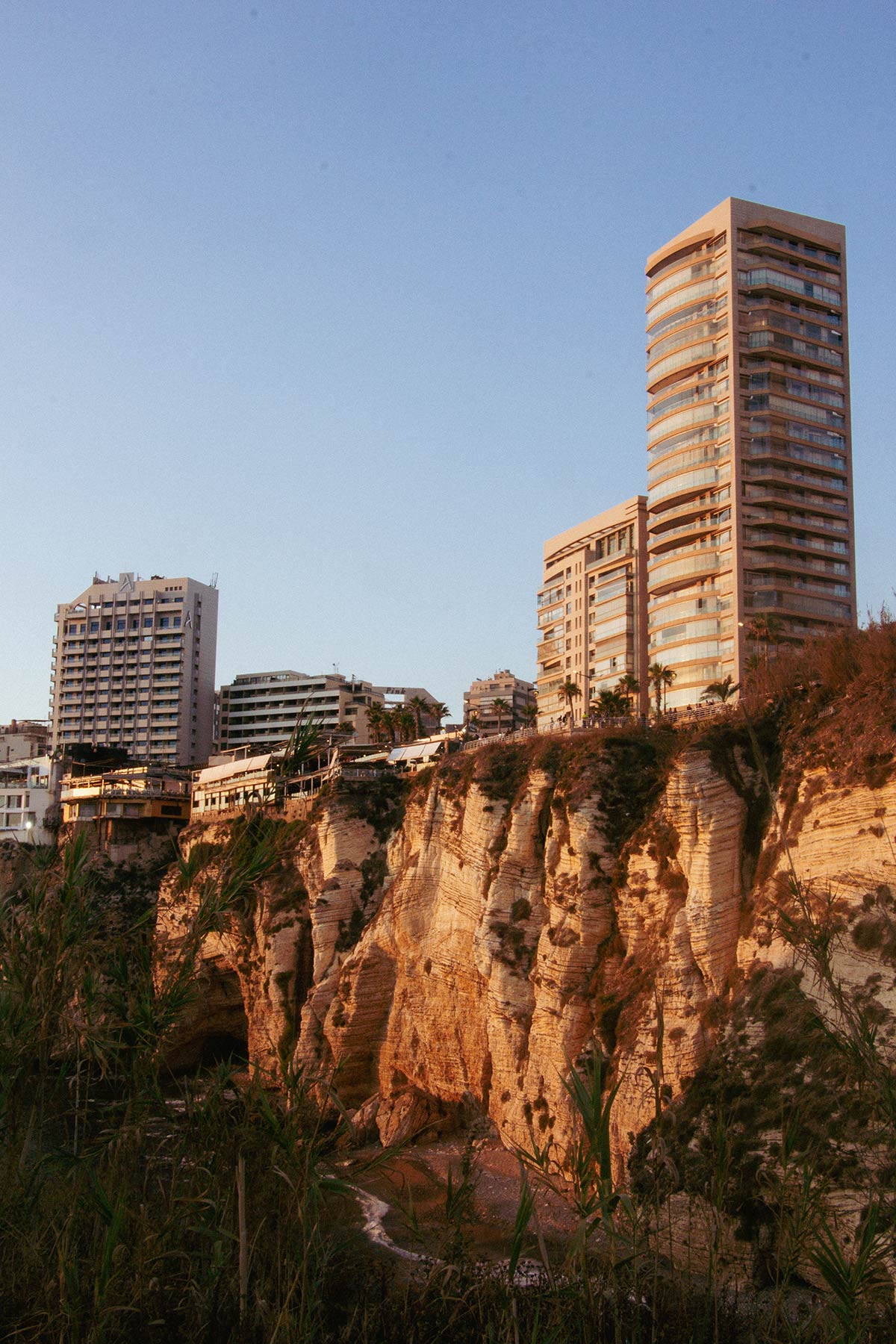
Many of us stay here, or return from elsewhere, because it’s where we belong, where we all understand each other without having to communicate much. It’s how Lebanese people can live side-by-side despite the sordid history of a brutal civil war that we still don’t know how to talk about.
No matter how often they’ve seen it, Beirut is still rush to the corniche, the city’s promenade, to catch the sunset. Shop owners throughout the city lay out food for the stray cats on the street. Several vendors in Hamra, my neighborhood, have a cat they have decided to care for as though it were their own. Whenever I walk down Hamra Street, I greet my favorite cats, all of whom I have named.
Men line up by the sea in their plastic chairs, smoking argileh, playing tawle, chain-smoking Marlboro cigarettes, and gossiping about their neighbors. I often wonder what these men were like as children—running around the same streets, playing tag or football with each other. Did they know that one day they would be sitting on those chairs for hours, like their elders, complaining about lying politicians, the price of gas, and arguments with their wives?
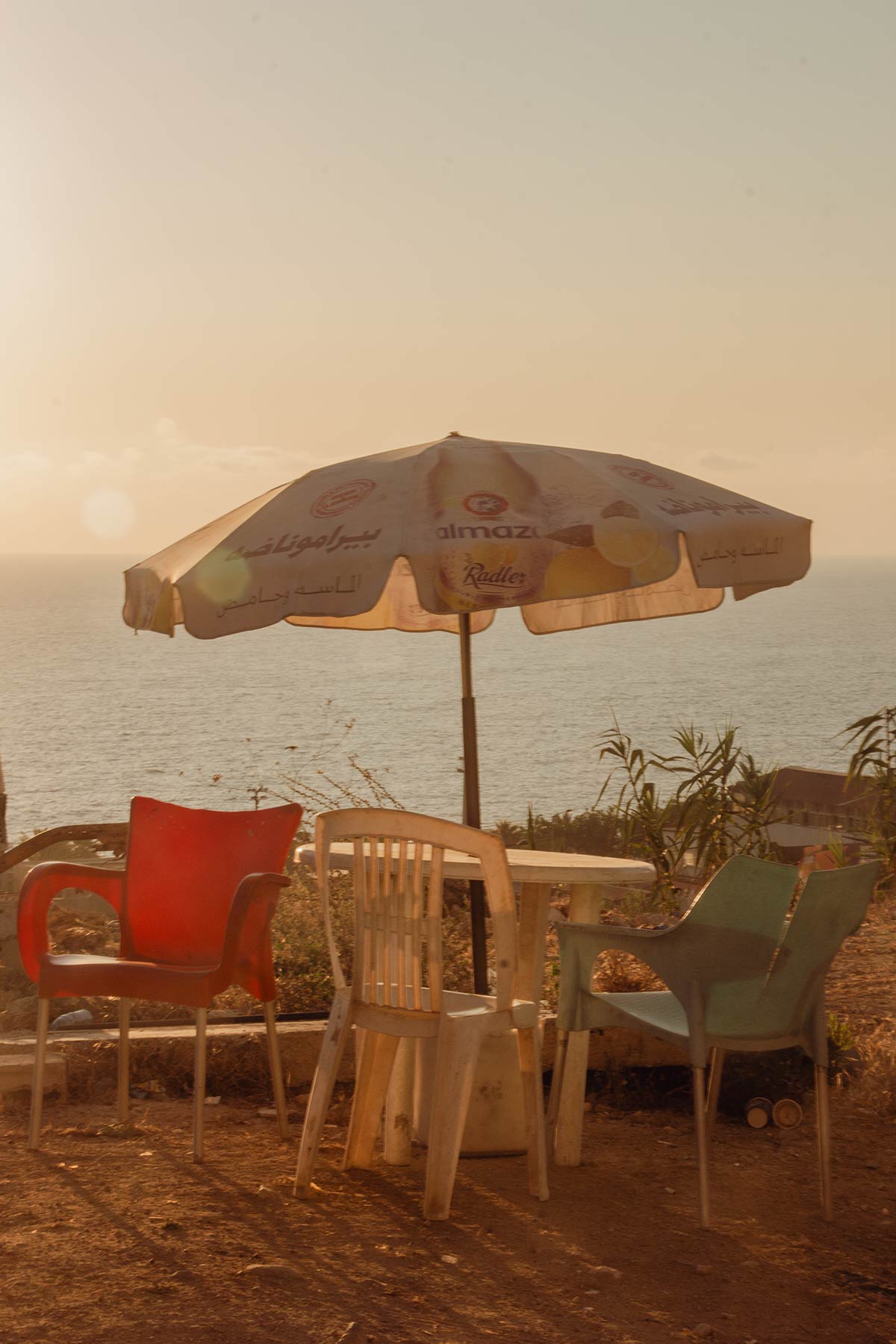
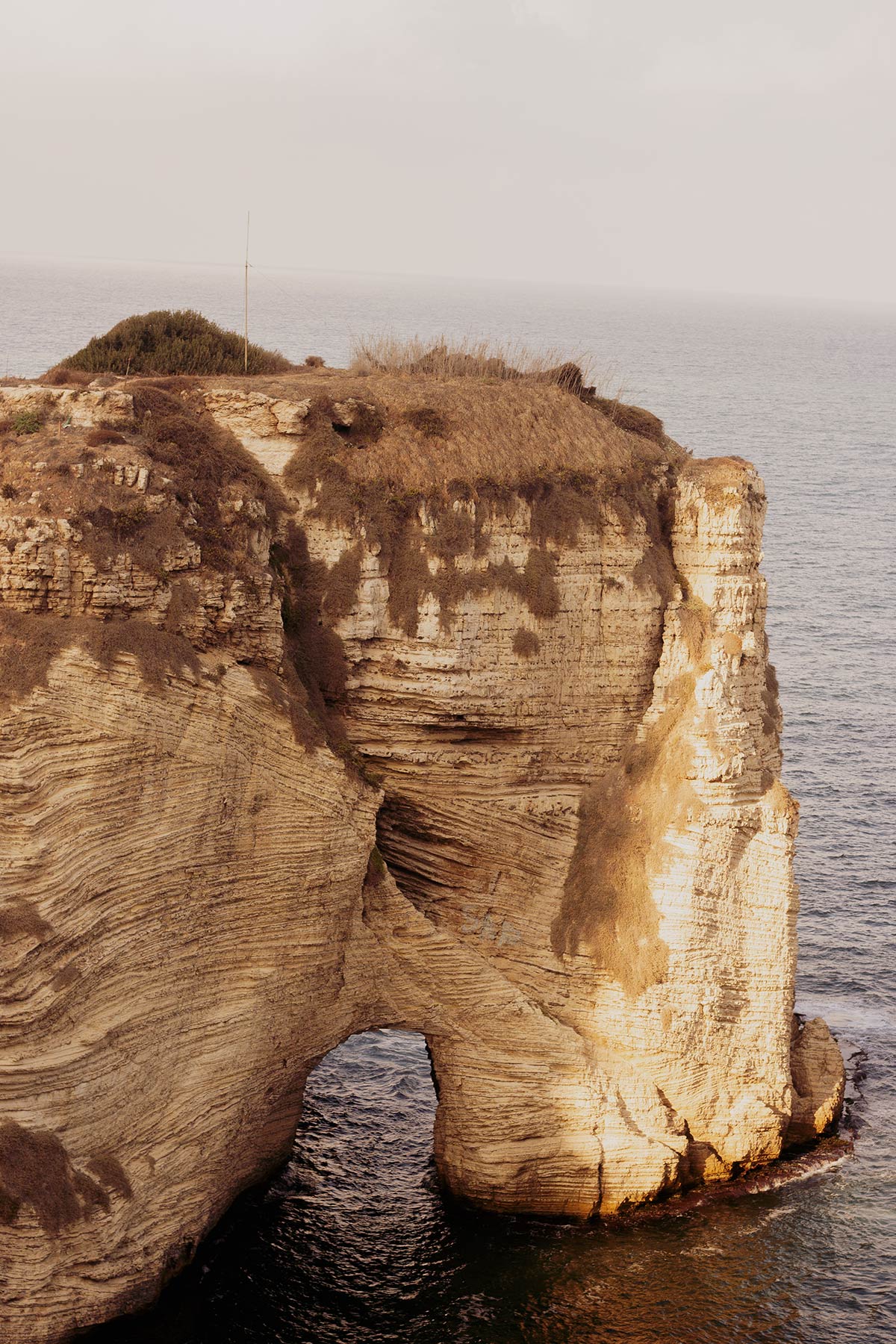
The recent war in Lebanon is still fresh in our memories, especially given that it isn’t over. Israel still bombs or aggresses on Lebanon every day. We are still grieving the men, women, and children who were mercilessly killed, the heritage that was destroyed, and the olive trees that were ripped from the ground.
Ibrahim Fawaz, the owner of the beloved bookstore in my neighborhood, was murdered in an Israeli strike while he was eating breakfast on his balcony at 4AM. I was woken up by the gut-wrenching sound of the bomb that took his life. I will never forget that sound.
My friend Farrah’s grandparents’ home in Kfarkila, in the South, is in ruins, the olive trees that once surrounded her family’s home gone. She is still savoring the last remaining drops of oil from her family’s final harvest.
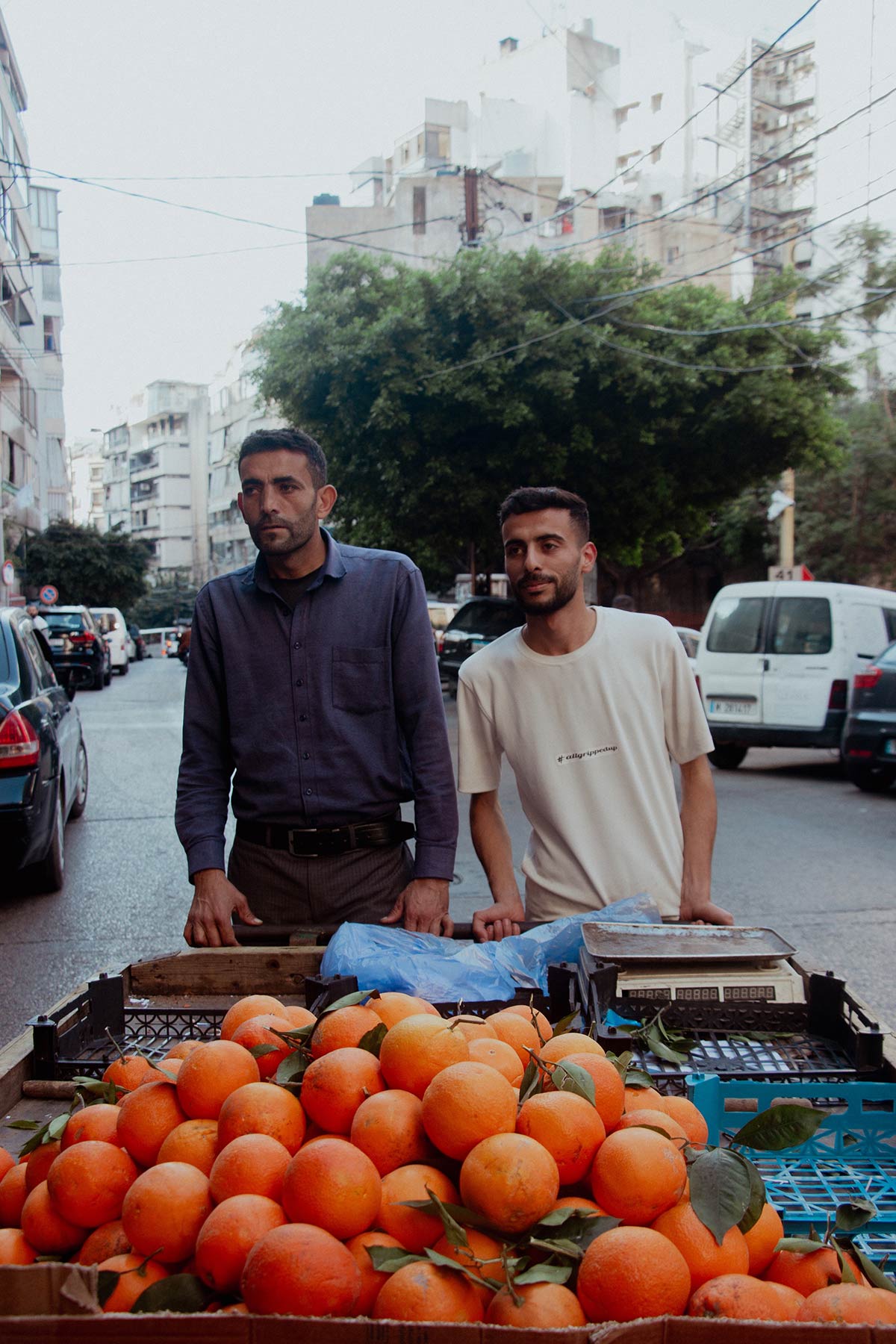
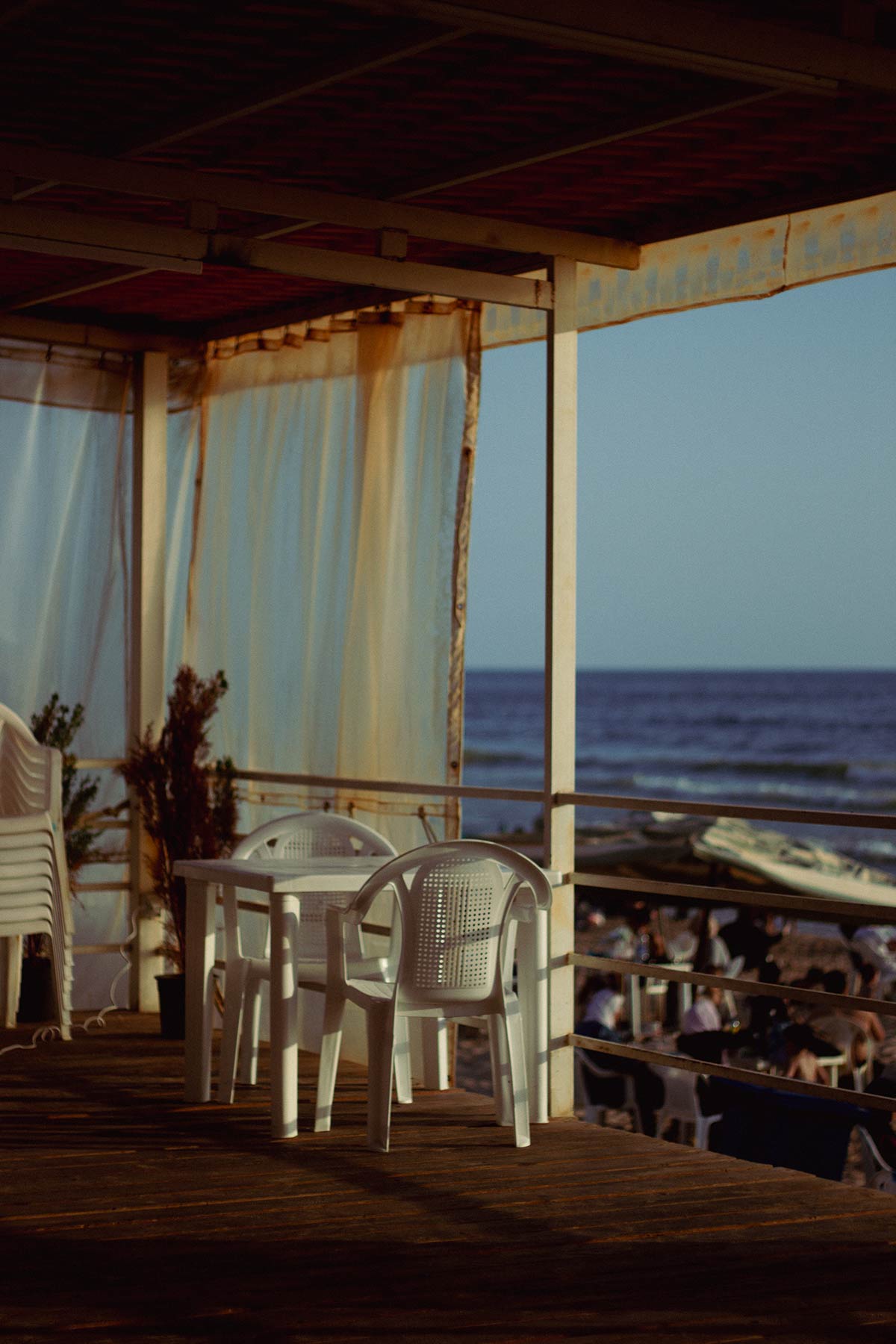
Look up at the sky, and you might spot an Israeli drone buzzing over us. If it’s not a drone, it’s a jet that, at any moment, could break the sound barrier. We share a feeling of doom knowing that Israel has broken the ceasefire over 4,000 times, and that they are still decimating residential buildings and targeting individuals in Southern Lebanon—anything that moves, in the name of their national security. We live every day not knowing what catastrophe awaits us. And yet somehow, this makes us more determined to stay.
“There is no future in Lebanon,” we say to each other, but somehow we still plan weddings, dinners, and birthday parties months in advance. We still dream about raising our children here.
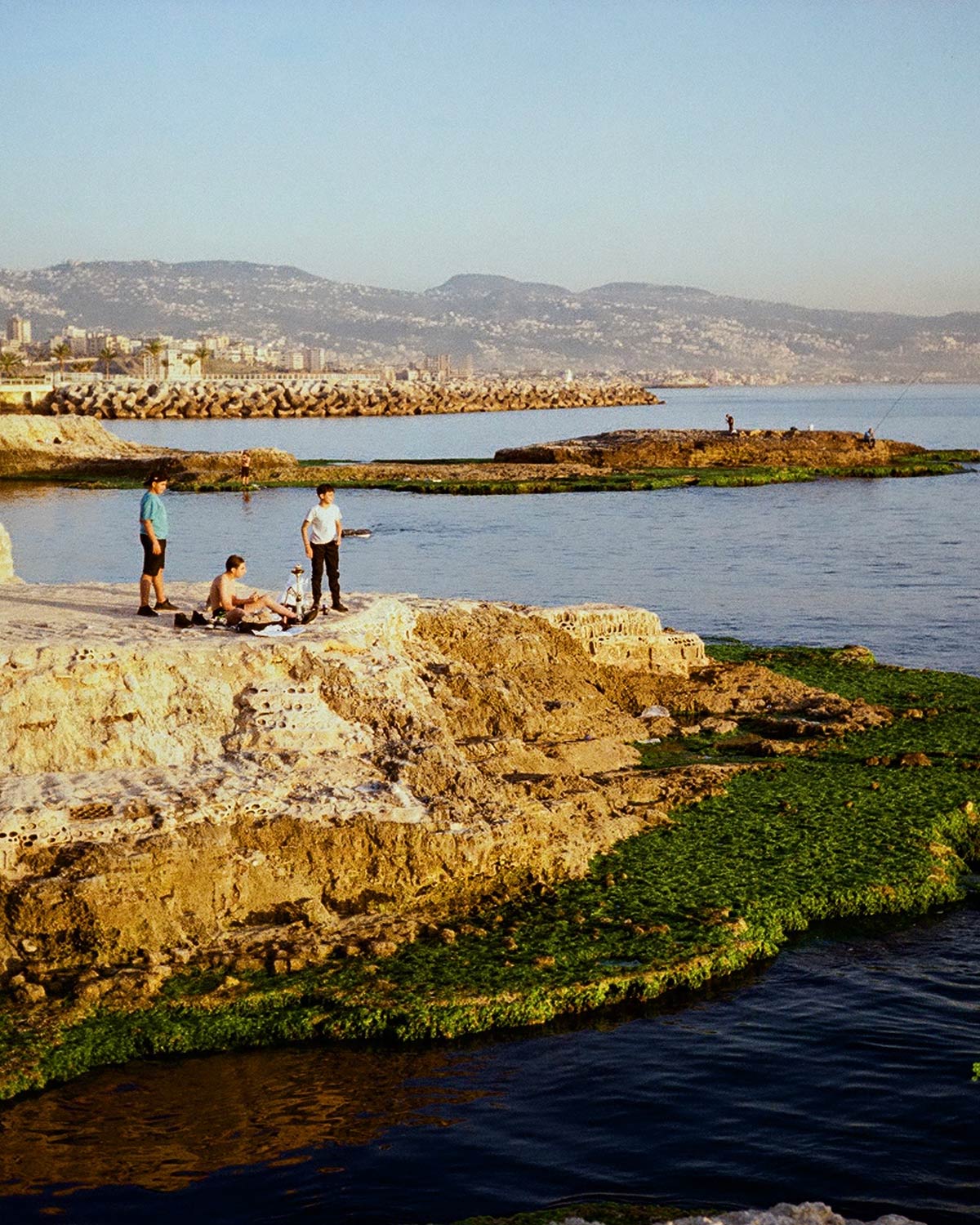
Throughout my entire life, my mother has insisted that I shouldn’t put down roots in Lebanon. After the Beirut port explosion in August 2020, she begged me to leave, telling me that not only would Lebanon continue to disappoint me, but it would probably eventually kill me. However, she has never listened to her own advice. She returned to Lebanon to raise me after having lived abroad for 20 years, ready to give Lebanon another chance after swearing she would never return. My grandmother was born and raised in Beirut and has never lived anywhere but the building we live in now.

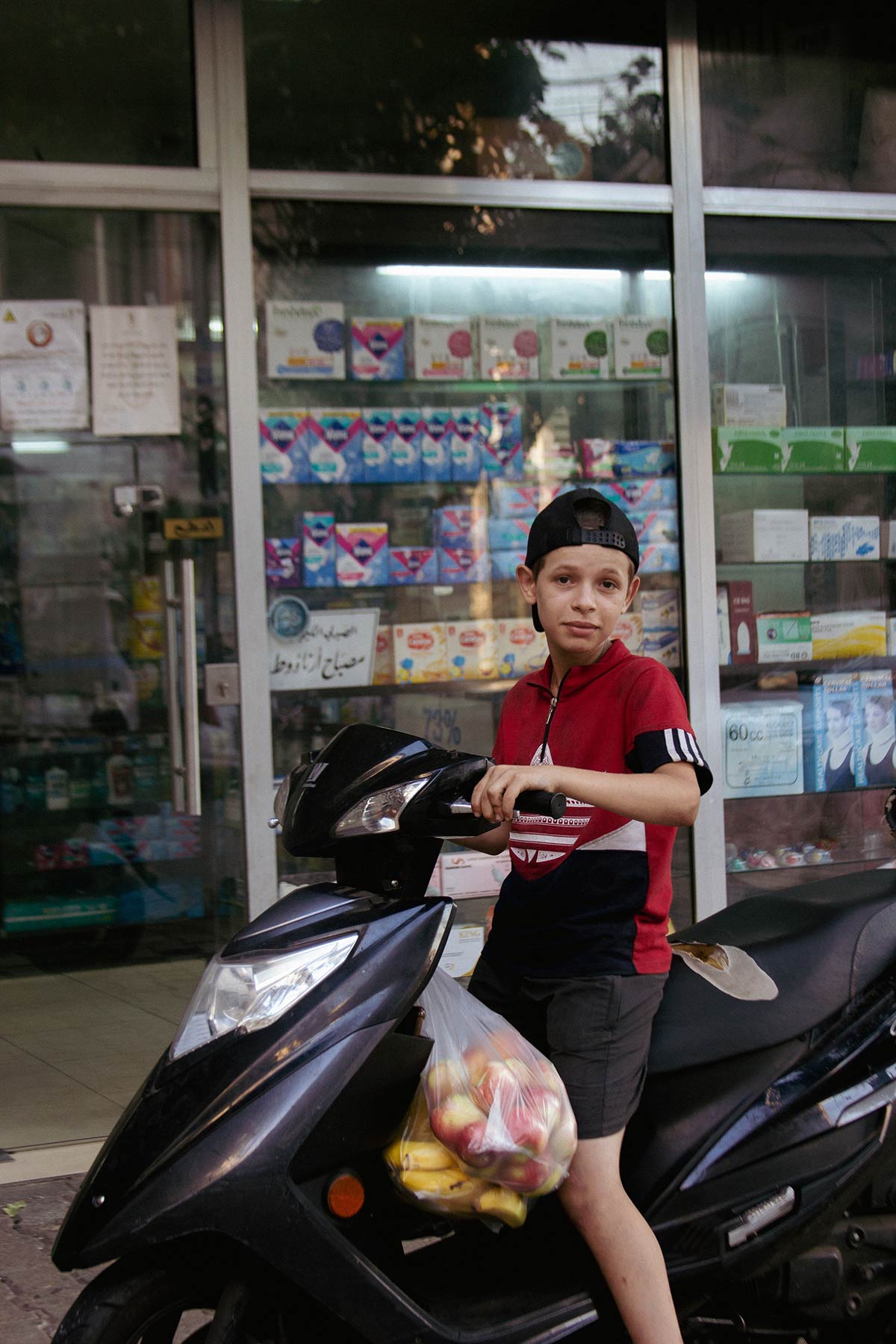
We desperately cling to Lebanon because we don’t know who we are without it. We come back, recklessly, because we miss it. We hope that we can be part of the change, even when people warn us that Lebanon is rotten from the inside out. Why do we stay here? Because in the deepest parts of us, we still have a twisted sense of hope that Lebanon will persevere. It’s too painful to imagine the alternative.
Sometimes I ask my Teta: “If you had the chance to emigrate elsewhere, would you?”
The answer she gives is no, every single time.
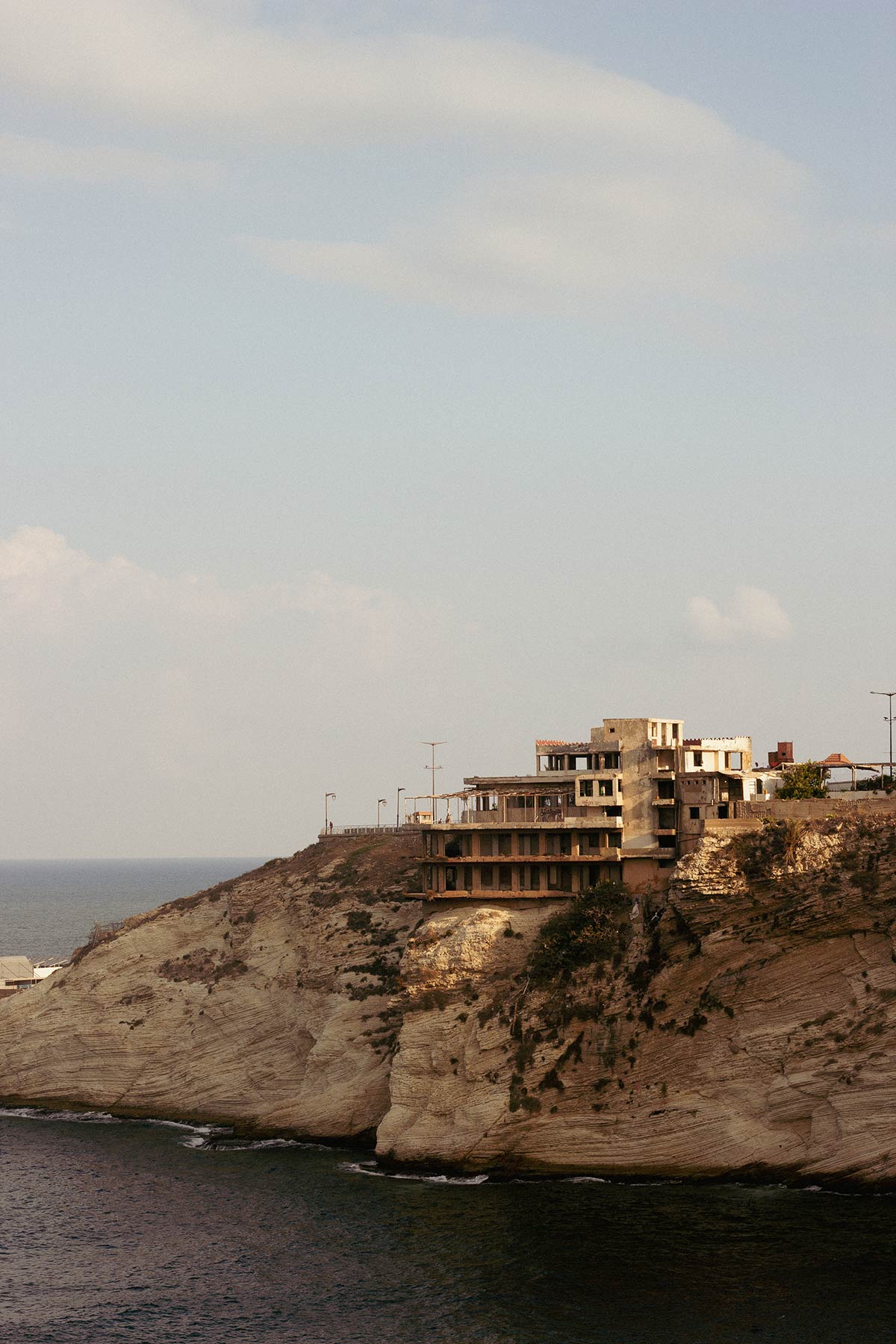
{
"article":
{
"title" : "There is no future here, and yet I stay",
"author" : "Ruwan Teodros",
"category" : "essays",
"url" : "https://everythingispolitical.com/readings/there-is-no-future-yet-here-i-stay",
"date" : "2025-11-21 09:00:00 -0500",
"img" : "https://everythingispolitical.com/uploads/ruwan-Ein-Mresseh_2025.jpg",
"excerpt" : "",
"content" : " Why do we stay here? Why do we come back?Lebanon is a difficult country to live in. It hardly provides potable water and a regular electricity supply to its residents. Most people cannot access their hard-earned savings because of the banks’ many years of mismanagement, corruption and risky lending to the government. It’s hard to come by reliable public transportation or Internet connection. Every day, there is a plethora of small frustrations: swarms of motorcycles driving in the wrong direction, going “3aks el seir,” the booming sound of privatized water trucks, garbage bins overflowing with garbage, and rats and cats fighting each other for a scrap of discarded food. When you look at Beirut from a distance, the city is covered in a persistent smog, air pollution that is blanketing the city in an ominous cloud.Beirut, my city, is made of endless contradictions. You can have an unpleasant encounter with a disgruntled bank employee, then have your whole day turned around by the man selling you vintage furniture. He invites you in for coffee with the warmest smile, and you say yes because it’s hard to resist his kindness.When I moved here from the U.S. with my mother in 2005, I was raised in a home full of magic and love. My grandmother lived in the apartment above ours. She picked me up from school and prepared lunch, which we ate together every day. I’m nearly 30 years old now, and my teta is still asking me if I’m coming over for lunch.My jeddo and I bickered over the television remote—he wanted the news, I wanted cartoons—and my teta would make him compromise by giving me an extra half hour. He grumbled but always caved. I was his first grandchild after all.Many of us stay here, or return from elsewhere, because it’s where we belong, where we all understand each other without having to communicate much. It’s how Lebanese people can live side-by-side despite the sordid history of a brutal civil war that we still don’t know how to talk about.No matter how often they’ve seen it, Beirut is still rush to the corniche, the city’s promenade, to catch the sunset. Shop owners throughout the city lay out food for the stray cats on the street. Several vendors in Hamra, my neighborhood, have a cat they have decided to care for as though it were their own. Whenever I walk down Hamra Street, I greet my favorite cats, all of whom I have named.Men line up by the sea in their plastic chairs, smoking argileh, playing tawle, chain-smoking Marlboro cigarettes, and gossiping about their neighbors. I often wonder what these men were like as children—running around the same streets, playing tag or football with each other. Did they know that one day they would be sitting on those chairs for hours, like their elders, complaining about lying politicians, the price of gas, and arguments with their wives?The recent war in Lebanon is still fresh in our memories, especially given that it isn’t over. Israel still bombs or aggresses on Lebanon every day. We are still grieving the men, women, and children who were mercilessly killed, the heritage that was destroyed, and the olive trees that were ripped from the ground.Ibrahim Fawaz, the owner of the beloved bookstore in my neighborhood, was murdered in an Israeli strike while he was eating breakfast on his balcony at 4AM. I was woken up by the gut-wrenching sound of the bomb that took his life. I will never forget that sound.My friend Farrah’s grandparents’ home in Kfarkila, in the South, is in ruins, the olive trees that once surrounded her family’s home gone. She is still savoring the last remaining drops of oil from her family’s final harvest.Look up at the sky, and you might spot an Israeli drone buzzing over us. If it’s not a drone, it’s a jet that, at any moment, could break the sound barrier. We share a feeling of doom knowing that Israel has broken the ceasefire over 4,000 times, and that they are still decimating residential buildings and targeting individuals in Southern Lebanon—anything that moves, in the name of their national security. We live every day not knowing what catastrophe awaits us. And yet somehow, this makes us more determined to stay.“There is no future in Lebanon,” we say to each other, but somehow we still plan weddings, dinners, and birthday parties months in advance. We still dream about raising our children here.Throughout my entire life, my mother has insisted that I shouldn’t put down roots in Lebanon. After the Beirut port explosion in August 2020, she begged me to leave, telling me that not only would Lebanon continue to disappoint me, but it would probably eventually kill me. However, she has never listened to her own advice. She returned to Lebanon to raise me after having lived abroad for 20 years, ready to give Lebanon another chance after swearing she would never return. My grandmother was born and raised in Beirut and has never lived anywhere but the building we live in now.We desperately cling to Lebanon because we don’t know who we are without it. We come back, recklessly, because we miss it. We hope that we can be part of the change, even when people warn us that Lebanon is rotten from the inside out. Why do we stay here? Because in the deepest parts of us, we still have a twisted sense of hope that Lebanon will persevere. It’s too painful to imagine the alternative.Sometimes I ask my Teta: “If you had the chance to emigrate elsewhere, would you?”The answer she gives is no, every single time."
}
,
"relatedposts": [
{
"title" : "aja monet’s new single: “hollyweird”",
"author" : "aja monet",
"category" : "visual",
"url" : "https://everythingispolitical.com/readings/aja-monet-hollyweird-release",
"date" : "2026-02-19 05:00:00 -0500",
"img" : "https://everythingispolitical.com/uploads/aja-monet---Hollyweird-_-Single-Art.jpg",
"excerpt" : "Surrealist blues poet aja monet shares her first new music since 2023 with the release of her timely new single “hollyweird” via drink sum wtr. The track, produced by monet, Meshell Ndegeocello and Justin Brown, arrives with a bold video directed by B+ and Monet herself, and features Chicago rapper and close collaborator, Vic Mensa.",
"content" : "Surrealist blues poet aja monet shares her first new music since 2023 with the release of her timely new single “hollyweird” via drink sum wtr. The track, produced by monet, Meshell Ndegeocello and Justin Brown, arrives with a bold video directed by B+ and Monet herself, and features Chicago rapper and close collaborator, Vic Mensa.“I wrote ‘hollyweird’ on scraps of found paper, frantically jotting down observations and sentiments of the moment during the Los Angeles fires and its aftermath,” monet explains. “The song is an Afropunkesque ode to frustrations and feelings around our current culture of social isolation and performative solidarity. I wanted to speak to the emptiness of ‘hollyweird’ not as a place but as a way of being where insincerity is normalized. Where social interactions become void in of sincerity and we lose sight of community and connection.”“hollyweird” is the first taste of new music from monet since the release of her debut album, when the poems do what they do, in 2023. The album was released by drink sum wtr to wide critical praise and was nominated at the 66th GRAMMY Awards for Best Spoken Word Poetry Album in 2024. The album marked the arrival of a singular poet and peerless lyricist. On it, monet explored themes of resistance, love, and the inexhaustible quest for joy.monet is bringing her singular live show to New York City’s famed Carnegie Hall Theater. The show will take place at the Zankel Hall on May 20th.Get the track on all digital platforms here"
}
,
{
"title" : "How to Resist “Organized Loneliness”: resisting isolation in the age of digital authoritarianism ",
"author" : "Emma Cieslik",
"category" : "essays",
"url" : "https://everythingispolitical.com/readings/how-to-resist-organized-loneliness",
"date" : "2026-02-13 15:11:00 -0500",
"img" : "https://everythingispolitical.com/uploads/American_protesters_in_front_of_White_House-11.jpg",
"excerpt" : "Over the past year, many of us have encountered, navigated, and processed violence alone on our phones. We watched videos of Renee Nicole Good and Alex Pretti being fatally shot and Liam Conejo Ramos being detained by ICE agents. These photos and videos triggered anger, sadness, and desperation for many (along with frustration that these deaths were the inciting blow against ICE agents that have killed many more people of color this year and last).",
"content" : "Over the past year, many of us have encountered, navigated, and processed violence alone on our phones. We watched videos of Renee Nicole Good and Alex Pretti being fatally shot and Liam Conejo Ramos being detained by ICE agents. These photos and videos triggered anger, sadness, and desperation for many (along with frustration that these deaths were the inciting blow against ICE agents that have killed many more people of color this year and last).While the institutions and people committing these crimes do not want them recorded, the Department of Homeland Security and the wider Trump administration is using “organized loneliness,” a totalitarian tool that seeks to distort peoples’ perception of reality. Although seemingly a symptom of COVID-19 pandemic isolation and living in a more social media focused world, “organized loneliness” is being weaponized to change the way people not only engage with violence but respond to it online, simultaneously desensitizing us to bodily trauma and escalating radicalization and recruitment online.Back in 2022, philosopher Samantha Rose Hill argued that the loneliness epidemic sparked by the COVID-19 pandemic could and would have dangerous consequences. She specifically cites Hannah Arendt’s 1951 book The Origins of Totalitarianism, which argued that authoritarian leaders like Hitler and Stalin weaponized people’s loneliness to exert control over them. Arendt was a Jewish woman who barely escaped Nazi Germany.As Hill told Steve Paulson for “To The Best Of Our Knowledge,” “the organized loneliness that underlies totalitarian movements destroys people’s relationship to reality. Their political propaganda makes it difficult for people to trust their own opinions and perceptions of reality.” Because as Arendt wrote, “the ideal subject of totalitarian rule is not the convinced Nazi or the convinced Communist, but people for whom the distinction between fact and fiction and the distinction between true and false no longer exist.”But there are ways in which we can resist the threat that “organized loneliness” represents, especially in the age of social media. They include acknowledging this campaign of loneliness, taking proactive steps when engaging with others online, and fostering relationships with friends and our communities to stand in solidarity amidst the rise of fascism.1. The first step is accepting that loneliness affects everyone and can be exploited by authoritarian movements.Many of us know this intimately. Back in 2023, the U.S. Surgeon General flagged an already dire loneliness epidemic, that in combination with a transition of most interaction onto social media, changes the way in which we engage with violence and tragedy online. But it can be hard to admit that loneliness affects us, especially when we are constantly connected through social media. It’s important to admit that even for the most digitally literate and active among us, “organized loneliness” not only can occur but especially occurs on social media.Being susceptible to or affected by “organized loneliness” is not a moral shortcoming or a personal failure but acknowledging it and taking steps to connect with one another is the one way we resist totalitarian regimes.2. Next, take social media breaks–and avoid doomscrooling.Even before the advent of social media or online news outlets, Arendt was warning about how loneliness can become a breeding ground for downward spirals. She explains that the constant consumption of tragic, violent, and deeply upsetting news–and watching it unfold in front of us can not only be overstimulating but can desensitize us and disconnect us from reality.While it can be difficult when most of our social lives exist on social media (this will be unpacked later), experts recommend that people limit using social media to less than two hours per day and avoid using it during the first hour after waking up and the last hour before going to sleep. People can use apps that limit overall screen time or restrict access to social media at set times–the best being Opal, One Sec, Forest, and StayFree. People can also use these apps to limit access to specific websites that might include triggering news.But it’s important to recognize that avoiding doomscrooling does not give people license not to stay informed or to look away from atrocities that are not affecting their communities.3. Resist social media echo-chambers by diversifying your algorithm.When you are on social media, however, it’s important to recognize that AI-based algorithms track what we engage with and show us similar content. People can use a VPN to search without creating a record that AI can track and thus offer us like offerings, but while the most pronounced (and reported on) examples focus on White, cis straight men and the Manoverse, echochambers can affect all of us and shift our perception of publicly shared beliefs.People can resist echo-chambers by seeking out new sources and accounts that offer different, fact-based perspectives but also acknowledge their commitment to resisting fascism, such as Ground News, ProPublica, and Truthout. Another idea is to follow anti-fascist online educators like Saffana Monajed who promote and share lessons for media literacy. People can also do this by cultivating their intellectual humility, or the recognition that your awareness has limits based largely on your own experiences and privileges and your beliefs could be wrong. Fearless Culture Design has some great tips.While encountering and engaging different perspectives is vital to resisting echochambers and social algorithms, this is not an invitation to follow or platform any news outlet, content creator, or commentator that denies your or other people’s personhood.4. Cultivate your friendships and make new ones.In a time when many of us only stay in contact with friends through social media, friendships are more important than ever. Try, if you can, to engage friends outside of social media–whether it’s through in-person meet ups (dinners, parties, game nights) or on digital platforms that are not social media-based, for example coordinating meet-ups over Zoom or Skype. This can be a virtual D&D campaign, craft circle, or a virtual book club. While these may seem like silly events throughout the week, they help build real connection.It’s important to connect with people outside of a space that uses an algorithm to design content and to reinforce that people are three-dimensional (not just a two-dimensional representation of a social media profile). There are even some apps that assist with this goal, such as Connect, a web app designed by MIT graduate students Mohammad Ghassemi and Tuka Al Hanai to bring students from diverse backgrounds together for lunch conversations.Arendt writes that totalitarian domination destroys not only political life but also private life as well. Cultivating friendships–and relationships of solidarity with your neighbors and fellow community members–are the ways in which we not only resist the destruction of private relationships but also reinforce that we and others belong in our communities–and that we can achieve great things when we stand together!5. With this in mind, practice intentional solidarity with one another.While it’s likely no surprise, fascism functions to both establish a nationalist identity that breeds extremism and destroy unification and rebellion against authority. The best way to resist the isolation that totalitarian governments breed is to practice intentional acts of solidarity with marginalized communities, especially communities facing systemic violence at the hands of an authoritarian power.Writer and advocate Deepa Iyer discusses the importance of action-based solidarity in her program Solidarity Is, part of the Building Movement Project, and Solidarity Is This Podcast (co-hosted with Adaku Utah) discusses and models a solidarity journey that foregrounds marginalized communities. I highly recommend reading her Solidarity Is Practice Guide and the Solidarity Syllabus, a blog series that Iyer just started this month to highlight lessons, resources, and ideas of how to cultivate solidarity within your own communities.6. Consume locally and ethically, and reject capitalist productivity.And one way that people can stand in solidarity with their communities is to support local small businesses that invest back into the communities. When totalitarianism strips people of many platforms to voice concern, one of the last remaining power people have is how and where they spend their money. Often, this is what draws the most attention and impact, so it’s important to buy (and sell) based on Iyer’s Solidarity Stances and to also resist the ways in which productivity culture not only disempowers community but devalues human labor.At the heart of Arendt’s criticism of totalitarian domination is the ways in which capitalism, a “tyranny over ‘laborers,’” contributes to loneliness itself (pg. 476). Whether intentional or not, this connects to modern campaigns not only of malicious compliance but also purposeful obstinance in which people refuse to labor for a fascist regime but to mobilize their ability to labor as a form of resistance–thinking about the recent walkouts and boycotts that resist by weaponizing our labor and our spending power.Not only should people resist the conflation of a person’s value to their productivity, but they should use their labor–and the economic products of it–as tools of resistance in capitalism.Thankfully as Arendy writes, “totalitarian domination, like tyranny, bears the germs of its own destruction,” so totalitarianism by definition cannot succeed just as humans cannot thrive under the pressure of “organized loneliness.” For this reason, it’s a challenge to hold on and resist the administration using disconnection to garner support for the dehumanization of and violence against human beings. But as long as we do, we have the most powerful tools of resistance–awareness, friendship, community, and solidarity–at our disposal to undo totalitarianism just as it was undone back in the 1940s."
}
,
{
"title" : "A Trail of Soap",
"author" : "susan abulhawa, Diana Islayih",
"category" : "excerpts",
"url" : "https://everythingispolitical.com/readings/a-trail-of-soap",
"date" : "2026-02-13 08:40:00 -0500",
"img" : "https://everythingispolitical.com/uploads/Trail_of_Soap.png",
"excerpt" : "From EVERY MOMENT IS A LIFE compiled by susan abulhawa. Copyright © 2026 by Palestine Writes. Reprinted by permission of One Signal Publishers/Atria Books, an Imprint of Simon Schuster, LLC.",
"content" : "From EVERY MOMENT IS A LIFE compiled by susan abulhawa. Copyright © 2026 by Palestine Writes. Reprinted by permission of One Signal Publishers/Atria Books, an Imprint of Simon Schuster, LLC.Illustration by Rama DuwajiI met Diana Islayih at a series of writing workshops I conducted in Gaza between February and May 2024. She was one of a couple dozen young people who traveled for hours on foot, by donkey cart, or in cars forced to crawl through the crush of displacement. They were all trying to survive an ongoing genocide. Still, they risked Israeli drones and bombs to be there, just to feel human for a few hours, like they belong in this world, to touch the lives they believed they might still have.Soft-spoken and slight, Diana was the only one who recognized me, asking quietly if I was “the real susan abulhawa.” Each writer progressed their piece at their own pace, and would read their work aloud in the workshops to receive group feedback. Diana’s was the only story that emerged almost fully formed, as if it had been waiting for language. She teared up the first time she read it aloud, and again, the second.By the third reading, the tears were gone. “I got used to the indignities,” she told me. “Now I’m used to reading them out loud.” She confessed that she struggled living “a life that doesn’t resemble me.” On our last day together, I reminded her of what she’d said. She smiled ironically. “Now I don’t know if I resemble life,” she said.What follows is Diana’s story, written from inside that unrecognizable life, bearing witness not through spectacle, but through one intimate moment in the unbearable weight of the everyday. — susan abulhawa, editor of Every Moment Is a Life, of which this essay is part.Courtesy of Simon & SchusterI poured yellow liquid dish soap into my left palm, which instinctively cupped into a deep hollow, like a well yearning to be a well once more. I would need to wash my hands after using the toilet near our tent, though the faucet was usually empty. Water had been annihilated alongside people in this genocide, becoming a ghost that graciously deigns to appear to us when it wishes to—one we chase after rather than flee.The miserable toilet was made of four wooden posts, wrapped in a makeshift curtain made from an old scrap of fabric—so sheer you could see silhouettes behind it. A blanket full of holes and splinters served as a “door.”Inside, a concrete slab with a hole in the middle. You need time to convince yourself to enter such a place. The stench alone seizes your eyelids and turns your stomach the moment it creeps into your nose.I thought about going to the damned, distant women’s public toilet. I hated it during the first weeks of our displacement, but it was the only one in the area where you could both relieve yourself and scrub off the dust of misery that clung to every air molecule.It infuriated me that it was wretched and run-down, and the crowding only made it worse—full of sand, soiled toilet paper, and sanitary pads scattered in every corner.“Should I go?” I asked myself, aloud.I decided to go, taking one step forward and two steps back. I’d ask anyone returning from the toilet, “Is there water in the tap today?” and await the answer with the eagerness of a child hoping for candy.“You have to hurry before it runs out!”Or, more often, “There isn’t any.”So we’d all—men, women, and children—arm ourselves with a plastic water bottle, which was a kind of public declaration: “We’re off to the toilet.” We’d also carry a bar of soap in a box, although most people didn’t bother using it since it didn’t lather and was like washing your hands with a rock.I looked up and exhaled, staring into the vast gray nothingness that stared right back at me. Then I stepped out onto the sand across from our ramshackle displacement camp—Karama, “Camp Dignity”—though dignity itself cries out in this filthy, exhausted place, choked with chaos and a desperate scramble to moisten our veins with a drop of life.The road was empty, as it was early morning, and even the clamor of camp life lay dormant at that hour. Still, I couldn’t relax my shoulders—to signal my senses that we were alone, that we were safe. My fingers remained clenched over the yellow dish soap, my hand hanging at my side to keep it from spilling.I crossed the distance to the toilet—step by step, meter by meter, tent by tent. The souls who dwelled in them, just as they were, unchanged, their curious eyes fixed on me. I passed a garbage heap, shaped like a crescent moon, overflowing with all kinds of empty food cans—food that had ruined the linings of our intestines and united us in the agonies of digestion and bowel movements.Something trickled from my palm—a thread of liquid that felt like blood dripping between my fingers, down my wrist in thickening droplets. My hand trembled, and my eyes blurred. I convinced myself—without looking—that it was all in my head, not in my hand, quickened my pace, my heartbeat thudding in my ears.At last, I reached the only two public toilets in the area, one for men and the other for women, both encased in white plastic printed with the blue UNICEF logo.Inside, I was met with the “toilet chronicles”—no less squalid than the toilet itself—unparalleled chatter among women who’d waited long hours in the line together.The old women bemoaned the soft nature of our generation, insisting our condition was a “moral consequence” of our being spoiled.Other women pleaded to be let into the toilet quickly because they were diabetic. They banged on the door with urgency and physical pain, like they would break in and grab the person behind it by the throat, shouting, “When will you come out?!”The woman inside yelled back, “I’m squeezing my guts out! Should I vomit them up too? Have patience! Damn whoever called this a ‘rest room’!”I looked around. A pale-faced woman smiled at me. I returned her smile, but my face quickly stiffened again, as if the muscles scolded me for stretching them into a smile. A voice inside me whispered meanly, What are you both even smiling about?A furious cry rang from the other stall, “Oh my God! Someone is plucking her body hair! What are you doing, you bitch? It’s a toilet! A toilet!”Another voice shot back, “Lower your voice, woman, and hurry up! The child’s crying!”Two little girls stood nearby, with tousled hair, drool marking their cheeks, their eyes half shut. They were crying to use the toilet, clutching their crotches, shifting restlessly in the sandy corridor where we stood.I was trying to push through to the water tap at the end of the hall, attempting to escape this tiresome, tragic theater. As my luck would have it, there was no water. I opened my palm. It too was empty. The yellow dish soap my mother bought yesterday was gone. All that remained was a sticky smear across my left hand and a long thread trailing behind me in the sand. Had it been dripping from my hand all along the way?I twisted the faucet handle back and forth—a futile hope for even a thin thread of water. Not a single drop came.My body sagged under the weight of rage, disappointment, fury, and a storm of unanswerable questions. I rushed through the crowded corridor of angry women, out into the street. I couldn’t hold back tears.I wept, cursing myself and the occupation and Gaza and her sea— the sea I love with a weary, lonely love, just as I’ve always loved everything in this patch of earth.I sobbed the entire way back. Without shame. I didn’t care who saw—not the passersby, not the homes or tents, not the ground I walked on. My grief rained tears on this land on my way there and back.But the land’s thirst is never quenched—neither with our tears, nor with our blood.My eyes were wrung dry from crying by the time I reached our tent. I collapsed on the ground, questions clamoring in my head.Can a homeland also be exile?Can another exile exist within exile?What is home?Is home the homeland itself, the soil of a nation?Or is it the other way around—the homeland is only so if it’s truly home?If the homeland is the home, why do I feel like a stranger in Rafah—a place just ten minutes from my city, Khan Younis?And why did I fear the feeling I had when I imagined myself in our kitchen, where my mother cooked mulukhiya and maqluba for the first time in six months, even though I wasn’t at home—in our house?That day, I said aloud, “Is this what the occupation wants? For me to feel ‘at home’ merely in the memory of home?”How can I feel at home without being there?How can I be outside of my homeland when I’m in it?I looked down at my hand—dry and cracked with January’s chill. The yellow soap liquid had turned into frozen white powder between my fingers."
}
]
}
















